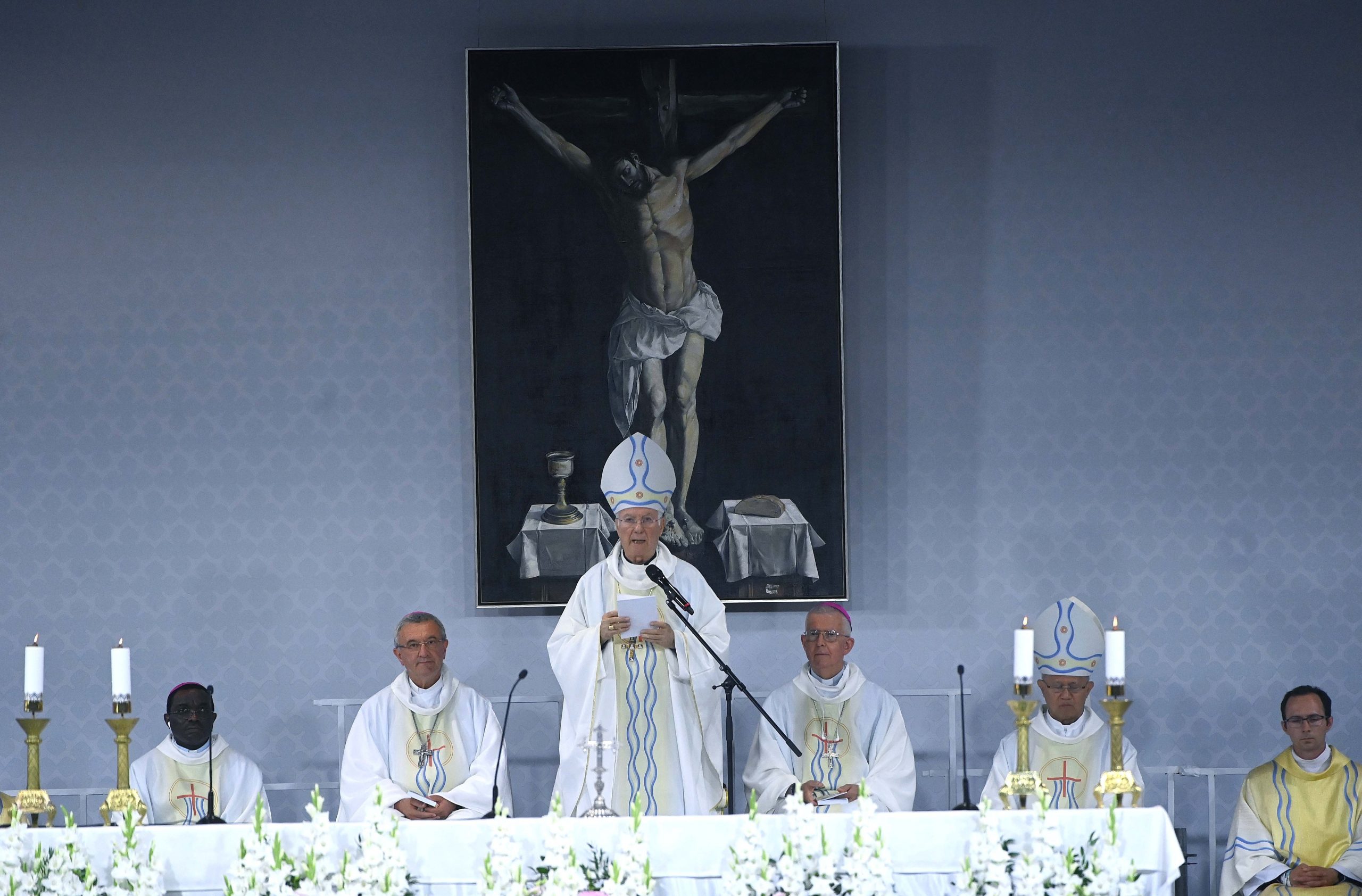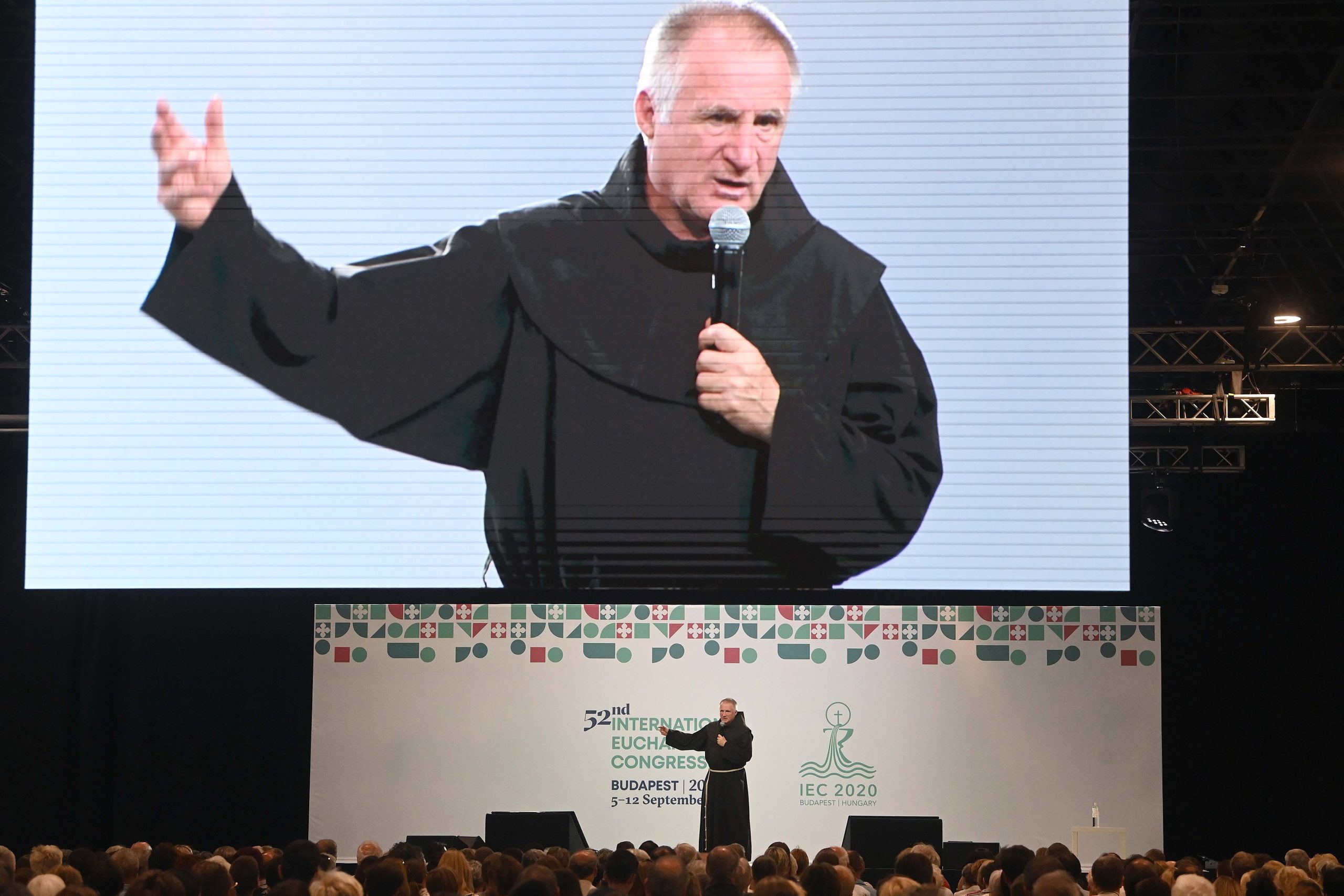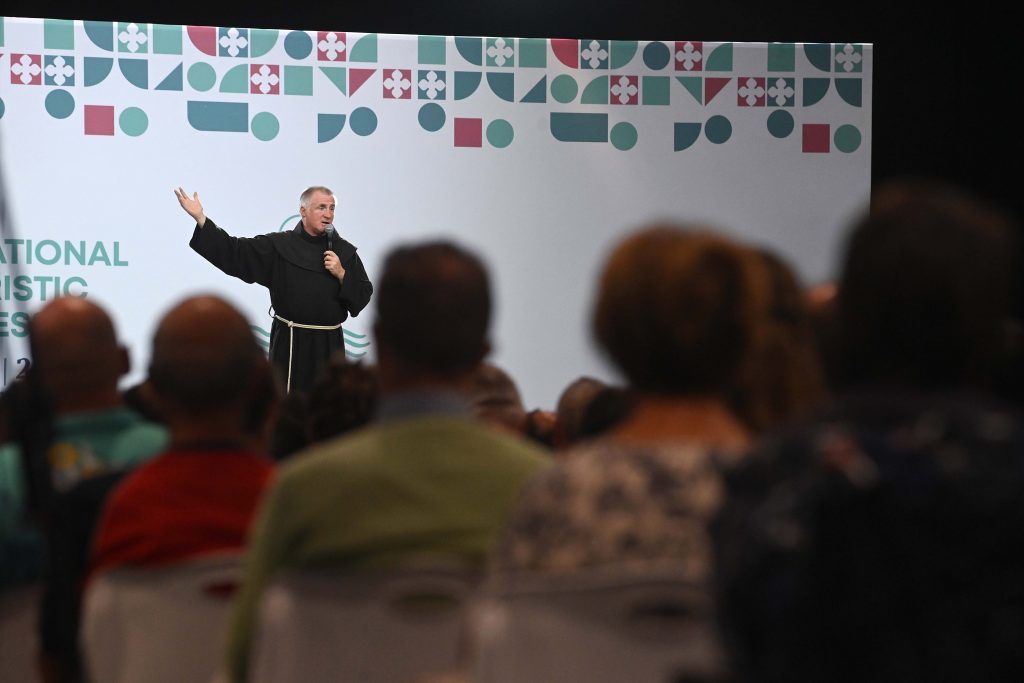
The future of our faith is determined by how we can use that liturgy in our life, Archbishop Piero Marini said at the 52nd International Eucharistic Congress in Budapest.Continue reading

Everyone who knows Brother Csaba or has heard him speak live knows that it is incredibly difficult to write about him because it is simply not possible to put into words all the love, serenity, joy, and humility that characterizes him and which he constantly radiates. But we will now try to summarize his talk on the second day of the Eucharistic Congress at the Budapest Hungexpo. One thing is certain: one has the feeling after the one-hour lecture, “Everything is really so simple!” Yes, if you follow only one commandment, which is the teaching of love.
This article was originally posted on our sister-site, Ungarn Heute.
When he enters the great hall, he is greeted with great applause. “One should not praise the day before the evening. What if you don’t like what I say? You will have clapped in vain…” he begins modestly and laughs.
And he begins to talk.
2,000 years ago, Jesus gave one commandment: the commandment of love. This is the main message of his whole speech. Brother Csaba emphasizes this again and again and from the beginning, he encourages everyone to dare to love, to dare to walk the path of love.
“Because even if this path is narrow and steep and only a few walk it, it leads to eternal life!”,
said the Franciscan friar and at the same time emphasized: “Jesus not only proclaimed but also practiced the commandment of love.”
He placed the commandment of love in the context of the 21st century and asked the questions that many had surely asked themselves in the past months/years: “What is God’s will in times of the coronavirus, the many floods, the many fires, or even the conflict in Afghanistan?”
“The answer lies 2000 years ago when the Heavenly Father said to Jesus, ‘Go, my son, and explain to them that it is better to live in love than to wage wars.’ Jesus could have said, ‘Have I ridden a dead horse?’ But he didn’t say that, he dared to come to the world alone on Christmas Eve. Jesus Christ dared to redeem the world with promise and hope because he believed in us. The heavenly Father had certainly not given him impossible tasks, and he knew it.”
He pointed out that Jesus’s public work did not begin by submitting a proposal to the EU to develop infrastructure to save the world, but by inviting two boys, John and Andrew, to come and see where he lived. Brother Csaba emphasized:
“God’s project can be realized.”
God is not intangible and not something abstract. Jesus was also a human being, he was a little child, he played soccer, he had friends. And he not only preaches the commandment of love, but he also PRACTICES it. This is the only commandment that the Master gave. Even on the cross, he says, “Do not be angry with them, they know not what they do.” He could have said, ‘I have preached in vain; let him who wants to save the world do it.’ But he does not say that, he trusts them even on the cross, he believes in them, in us.”
Brother Csaba says yes, because where there is love, there is dialogue, solidarity, and mercy. He thinks we are very lucky in Europe because we have a strong Christian tradition here. “In Europe, even if you don’t go to church, you are still deeply rooted in Christianity. Even those who have no relationship with Christianity are imbued with the commandment of love. We don’t tolerate anyone who is inconsiderate, rude, or cruel. Why is this so? Everything comes from the teachings of Jesus Christ.”
Referring to the situation in Afghanistan, he said that 50,000 “hardliners” are trying to impose their ideology on 40 million people, which is why five million people have to flee the country. In contrast, the continent’s 500 million people were able to peacefully discuss how to proceed in the European elections, the minority was able to accept the opinion of the majority, and “we are not killing each other,” he said.
Among other things, Csaba Böjte spoke about the importance of confession, the importance of putting aside one’s worries, complaints, patience, and, as he said, “believing in the ultimate victory of love” and “daring to show our love for each other.” Böjte also pointed out that nowadays it is “fashionable” to complain, whine, always look for fault, and criticize each other. At this point, he said, “I believe that in the last thousand years no Hungarian has lived so well in the Carpathian Basin.”
He recalled the year 1993 when he took in the first orphans in Transylvania.
“In Romania, there was an economic crisis and many children were begging in front of the church. ‘What can I do in such a situation?’, I asked. We took in the first children. At first, we just fed and bathed them, then we did week-long camps. The kids asked if the camp could be longer. That turned into the 30-year-old camp that’s still going.”
Hungary has provided a lot of help to orphans in Transylvania over the past 30 years, for which he expressed gratitude. “It is a great thing to experience solidarity.”

Photo by Noémi Bruzák/MTI
1. Before he put himself in the service of God, he trained as a vehicle electrician and even worked as a miner.
2. During the Ceausescu dictatorship, he secretly entered the Franciscan Order and studied in Gyulafehérvár (Alba Iulia) and Esztergom before being ordained in 1989.
3. Next year will be the 30th anniversary of Brother Csaba’s transfer to Déva, where he began his remarkable mission for children.
4. The first resident of the house in Déva was a little girl who was found at a railroad station. The second, a girl, was only eight months old when she was placed with Brother Csaba and his colleagues. The little girl and her mother were homeless and the girl was left behind by her mother after they were freezing at the train station. She promised to come back to her if she found a place to live. This actually happened- a decade later she showed up.
5. For six years the home, by now with more and more residents, functioned without a legal framework because there was no legislation that would have regulated the operation of the institution. This was not without risks, because after the establishment, the police went out several times to ask Brother Csaba to remove the children from the parish, but he refused to put anyone on the street or send them away.
6. During his visit to Romania, Pope John Paul II asked the state to return three properties, including the Franciscan monastery in Déva, to the Church. The monks were expelled from Déva by the communist regime in 1948 and their property was nationalized. In 1992, the Franciscans regained possession of the building, but it was not until five years later that it was officially returned by the state.
7. On the 2000th anniversary of the birth of Christ, the Franciscans, and Csaba Böjte dreamed not of erecting a statue, but of providing shelter, food, and moral guidance to even more children in need. They applied and won a bid for the renovation of the monastery in Broos, and the Saint Elizabeth Children’s Home was born. The Hungarian Bishops’ Conference launched a campaign called “Share your bread with the hungry!”, and they organized a collection for orphans in Transylvania. From the collected funds they bought the home in Szováta (Sowata). The donations through the 1 percent of personal income tax enabled the construction of another home.
8 A piece of advice to avoid complicating things unnecessarily: “If a flower wilts, water it! If a small bird knocks at the window in the cold, feed it. If someone is in need, reach under his arm, at least tell him a joke, make him laugh, wipe away his tears! If he does not understand something, explain it!
Let us dare not only to give gifts but to become God’s gift, God’s blessing.”
9. How should we look at our life, our situation? “At the last Eucharistic Congress it was said that religion was in trouble, but how many young people came in 1938! Yes, but then in ’39 and ’40 these young people were at each other’s throats so much that Europe was turned to rubble. Maybe fewer young people go to church today, but you can’t persuade them so easily to invade another country at gunpoint. The world is clearing up, I think. There may be less formal religiosity, but if you do to a dog or a cat the kind of cruelty that people did to each other not so long ago, you get a lot more censure for it. I truly feel that this world is getting more and more beautiful, unfolding and evolving.”
10. What does poverty mean to Csaba Böjte? “When I go somewhere without children, I feel like a beggar. I feel poor.”
In conclusion, he asked the question: “Could we have covered a greater distance in 2,000 years? Perhaps. But at least we are on the right track.”
Featured image: Csaba Böjte giving his speech at the Eucharistic Congress, via Noémi Bruzák/MTI